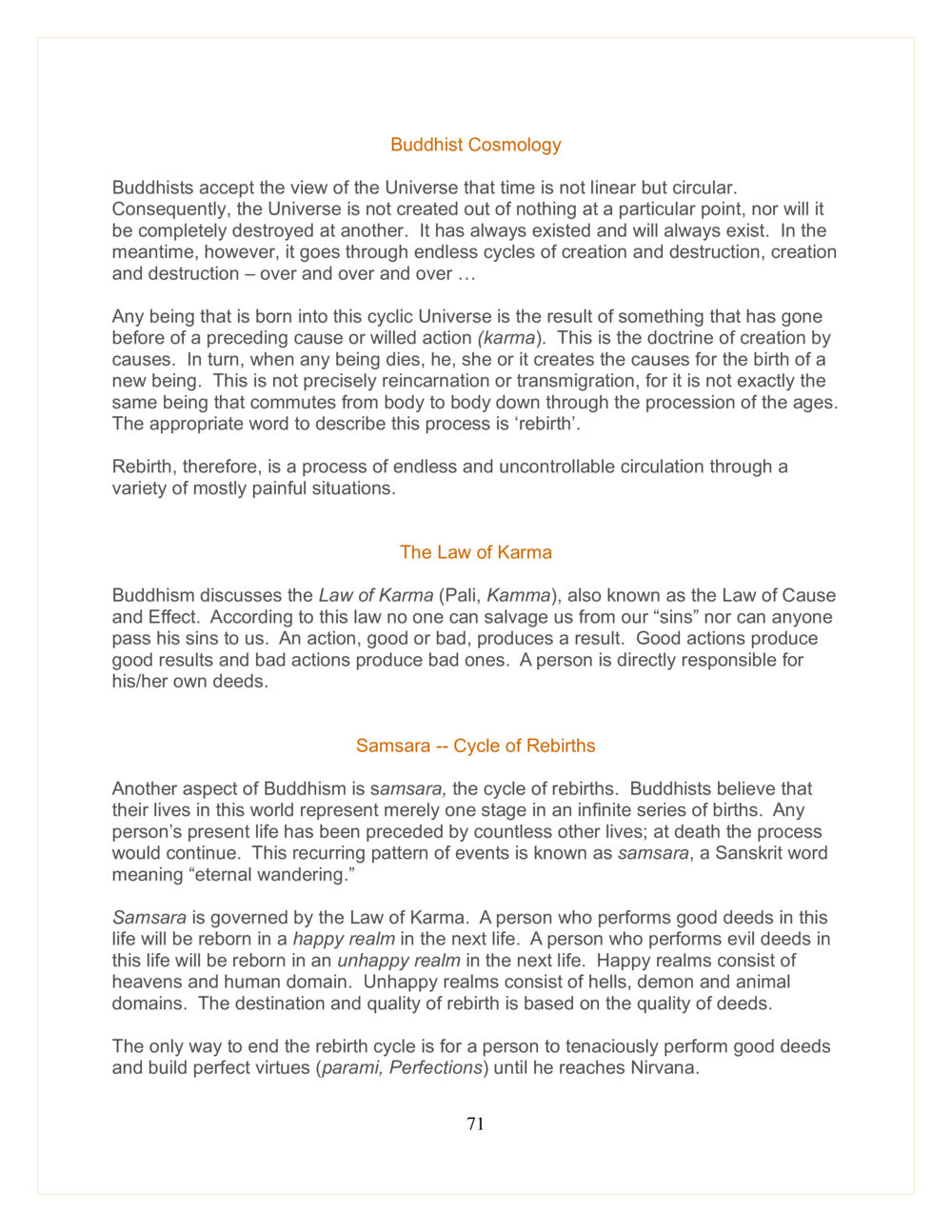Buddhist Cosmology and the Cycle of Rebirth : หน้า 71/115
DMC Translor’s handbook : หน้า 71/115 Explore the concepts of Buddhist cosmology, including the cyclical nature of the universe, the Law of Karma, and the process of rebirth.
0 ครั้ง

สรุปเนื้อหา
Buddhist cosmology views the universe as cyclical, with no creation or destruction at a single point in time. Beings are born into this cycle due to preceding causes (karma), leading to a process termed 'rebirth.' The cycle of samsara represents various states of existence, influenced by one's actions. Good deeds lead to favorable rebirths, while bad deeds result in suffering. The ultimate goal is to cease rebirth by cultivating virtues and achieving Nirvana, thereby breaking free from the endless cycle of samsara.
หัวข้อประเด็น
-Buddhist cosmology
-Cycle of rebirth
-Law of karma
-Samsara
-Rebirth process
-Nirvana
ข้อความต้นฉบับในหน้า
Buddhist Cosmology
Buddhists accept the view of the Universe that time is not linear but circular. Consequently, the Universe is not created out of nothing at a particular point, nor will it be completely destroyed at another. It has always existed and will always exist. In the meantime, however, it goes through endless cycles of creation and destruction, creation and destruction – over and over and over …
Any being that is born into this cyclic Universe is the result of something that has gone before of a preceding cause or willed action (karma). This is the doctrine of creation by causes. In turn, when any being dies, he, she or it creates the causes for the birth of a new being. This is not precisely reincarnation or transmigration, for it is not exactly the same being that commutes from body to body down through the procession of the ages. The appropriate word to describe this process is ‘rebirth’.
Rebirth, therefore, is a process of endless and uncontrollable circulation through a variety of mostly painful situations.
The Law of Karma
Buddhism discusses the Law of Karma (Pali, Kamma), also known as the Law of Cause and Effect. According to this law no one can salvage us from our “sins” nor can anyone pass his sins to us. An action, good or bad, produces a result. Good actions produce good results and bad actions produce bad ones. A person is directly responsible for his/her own deeds.
Samsara -- Cycle of Rebirths
Another aspect of Buddhism is samsara, the cycle of rebirths. Buddhists believe that their lives in this world represent merely one stage in an infinite series of births. Any person’s present life has been preceded by countless other lives; at death the process would continue. This recurring pattern of events is known as samsara, a Sanskrit word meaning “eternal wandering.”
Samsara is governed by the Law of Karma. A person who performs good deeds in this life will be reborn in a happy realm in the next life. A person who performs evil deeds in this life will be reborn in an unhappy realm in the next life. Happy realms consist of heavens and human domain. Unhappy realms consist of hells, demon and animal domains. The destination and quality of rebirth is based on the quality of deeds.
The only way to end the rebirth cycle is for a person to tenaciously perform good deeds and build perfect virtues (parami, Perfections) until he reaches Nirvana.
หน้าหนังสือทั้งหมด
หนังสือที่เกี่ยวข้อง
Load More



















































































































